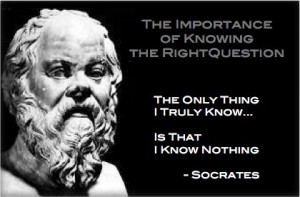
What Advice Is Right For Me?
Have you ever asked yourself “What Advice Is Right For Me?” after asking a few trusted sources and getting very different answers from each source?
The Hard Choice:
Knowing who to listen to and who not to listen to can get confusing, hectic even. Between friends and family, co-workers and acquaintances, making the right decision from a bunch of decisions could be more stressful than it needs to be. And, of course you don’t want to let all of those people down who spent their precious time giving you such great advice, right?
Not necessarily.Take for instance this quote from the late Joan Rivers:
“Don’t follow any advice, no matter how good, until you feel as deeply in your spirit as you think in your mind that the counsel is wise.”
What’s interesting that this quote is itself advice. But I think she makes a good point. If there is any doubt in your mind and/or in your spirit that something just does not fit with your situation or way of living, follow your gut. I cannot think of anything worse than following incompatible advice and later on finding out that the doubt you felt was real and that advice was really bad for you. Really, really bad.
Advice On Taking Advice:
1) Ask the right questions. In order to gain clarity on a situation you have got to ask the right questions. Be precise, not vague. Be honest about what you need and what your situation is. Sometimes explaining what inspired the question helps.
2) Ask the right people. If you know Person A has problems with finances why would you ask Person A about financial concerns? If you know Person B has an unhealthy bias against something you love, why would you ask them for advice on how to do better at the very thing they dislike? Pick your advisers wisely. Make sure they have both experience, wisdom, and an open mind in order to help you in any way possible.
3) Have an open mind. Sometimes the advice we get is pretty good but we disagree with it or don’t like how it is presented. Having an open mind about the situation allows us to hear what we don’t want to hear in order to hear what we need the most.
4) Think about the situation on your own first. It helps if you come step up to the plate having already done a bit of troubleshooting. A friend shared a Socrates quote with me that has been stuck in my head for a while now:
“To find yourself, think for yourself.”
Now, I don’t know if Socrates really said this but I also don’t care. I think it is brilliant. Learning how we think, what our patterns and concerns are could really help us figure out how we deal with issues and if that needs to change. That answer could be inside you the entire time. Look for it.
5) Weigh your options. If you’ve asked more than one person, you might want to sleep on what has been shared with you. Who seems to understand the situation the best? Who gave you the clearest opinion? Who has the wisdom and resonated with you when they spoke with you? Follow your intuition and pair it with critical thinking.
6) See if some advice can be combined. Maybe Person A’s advice is compatible with Person B’s and that compound advice is a worthy option. There is nothing wrong with being innovative with your findings and customizing advice, especially if all sides make good points.
Even with this advice, which is common enough, I wonder how much of it is standard and how much of it is easy to apply because it is safe. I don’t want to give bad advice right now but I am all about taking chances and being creative with how I seek answers. It might not hurt to take a riskier route and do the unexpected like seek advice from someone you know but do not have a close bond with or from someone who you trust but who lives a very different life than you do in order to see what a dissimilar mind might come up with. I’ve done the latter and have had great, eye-opening results.
That’s all I have for now but I am sure there is more out there to consider, which brings me to this point: keep with you a healthy amount of both faith and doubt. Keep hope alive, as they say, but also be ready to ask healthy questions.
Resources
Dear Abby – Tried and true.
How To Take Good Advice And Actually Use It To Better Your Life – Some really good points here about the failure of taking advice and ho a lot of what we ask for help with is habitual and no amount of good advice will change it.
~Phillip
Glappitnova unites influencers and talent from different industries through storytelling, performances, classes, and events for one crazy 8 day experience in Chicago.The opinions expressed here by Glappitnova.com contributors are their own, not those of Glappitnova.com.
comments
 AI Will Impact 400 Million Jobs by 2030 So Let’s Prepare
AI Will Impact 400 Million Jobs by 2030 So Let’s Prepare
 From Redmoon to Newmoon Theater Announcing Alex Balestrieri on The Global Committee
From Redmoon to Newmoon Theater Announcing Alex Balestrieri on The Global Committee
 Announcing Wingsuiter and Curator Kody Madro on The Global Committee
Announcing Wingsuiter and Curator Kody Madro on The Global Committee
 Glappitnova 2.0
Glappitnova 2.0
 Announcing Creative and Engineer Josh Onwordi On The Global Committee
Announcing Creative and Engineer Josh Onwordi On The Global Committee
 Announcing Global Healthcare Executive Samantha Thaver on the Glappitnova Global Committee
Announcing Global Healthcare Executive Samantha Thaver on the Glappitnova Global Committee
 Announcing Illini Track Star Turned Entrepreneur Jonathan Wells On The Global Committee
Announcing Illini Track Star Turned Entrepreneur Jonathan Wells On The Global Committee
 Announcing Ella McCann On The Glappitnova Global Committee
Announcing Ella McCann On The Glappitnova Global Committee
 Announcing Cultural Executive Andrew Harris On The Global Committee
Announcing Cultural Executive Andrew Harris On The Global Committee
 Announcing Matt Carney Of Root Tulsa On The Glappitnova Committee
Announcing Matt Carney Of Root Tulsa On The Glappitnova Committee
 Announcing Jerica D. Wortham Tulsa On The Global Committee
Announcing Jerica D. Wortham Tulsa On The Global Committee
 Announcing Michael Grogan Tulsa On The Glappitnova Global Committee
Announcing Michael Grogan Tulsa On The Glappitnova Global Committee
 Community Development Tips For Millennial Audiences, Wanna Come?
Community Development Tips For Millennial Audiences, Wanna Come?
 The Advertising Industry Is Working Scared
The Advertising Industry Is Working Scared
 Announcing Our New Platform, Foonova
Announcing Our New Platform, Foonova
